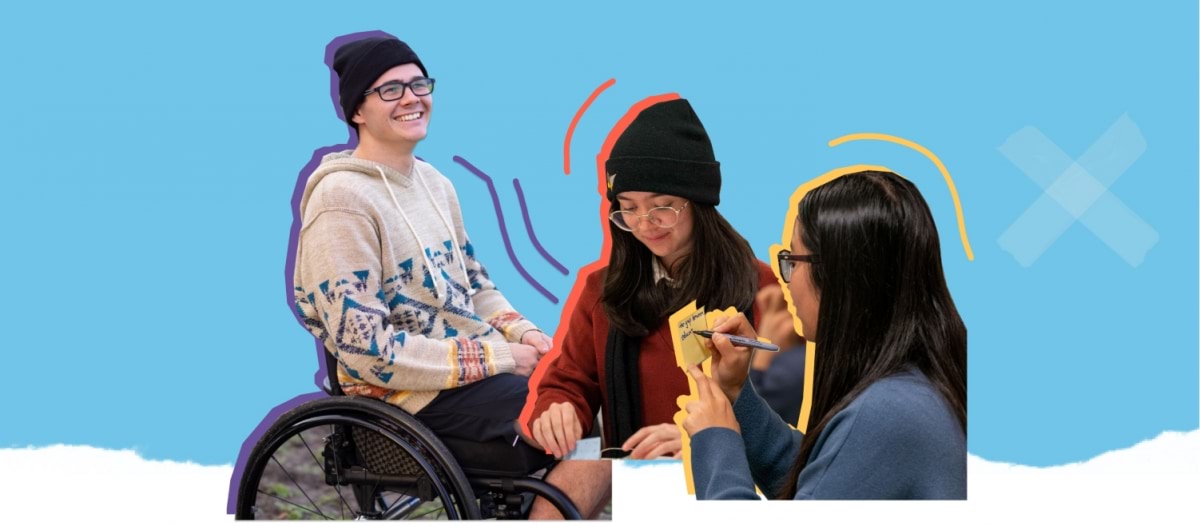
Young people and community members told us what issues to focus on and how we could address them.
Here is what we heard:
Young people want to get involved, but not at any cost
It is important that young people have meaningful opportunities to contribute to the decisions that affect them. Young people have a range of valuable insights and life experience, and can improve government policies and programs if they have genuine opportunities to influence them. However, young people’s commitment to causes they care about can sometimes exhaust them if their input does not result in genuine change.
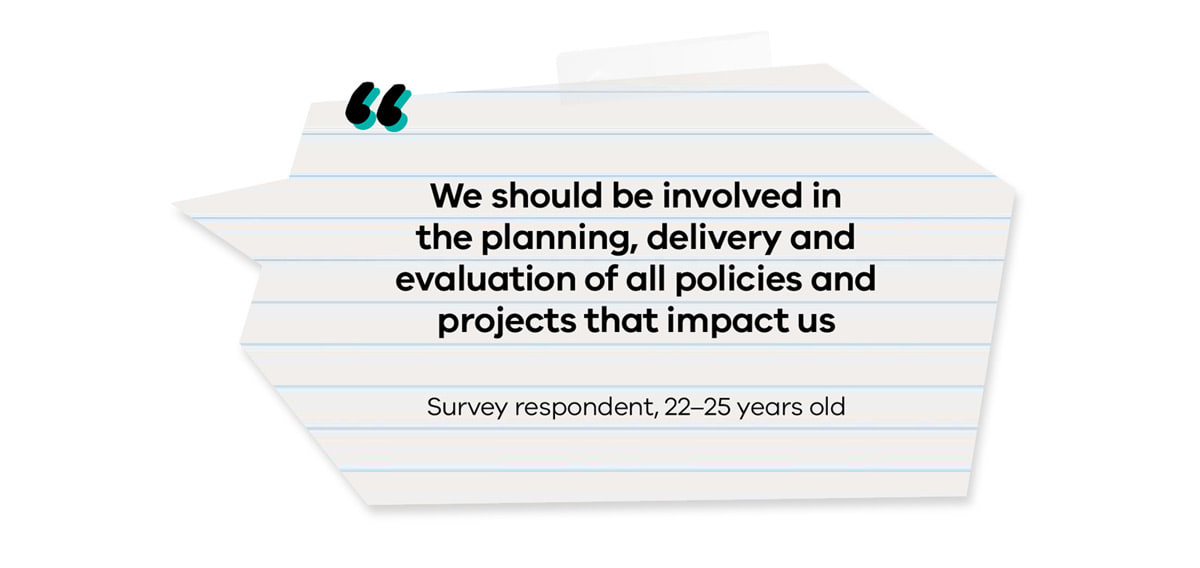
Young people want to see more focus on mental health
Mental health is the top issue for young people. They want to be able to access mental health support that is age-appropriate and culturally safe when they need it – ideally before reaching crisis point. This support should recognise that mental health affects all areas of people’s lives. Young people also want to reduce the stigma attached to mental illness. Many struggle with the everyday impacts of anxiety and loneliness, as well as online bullying and climate anxiety.
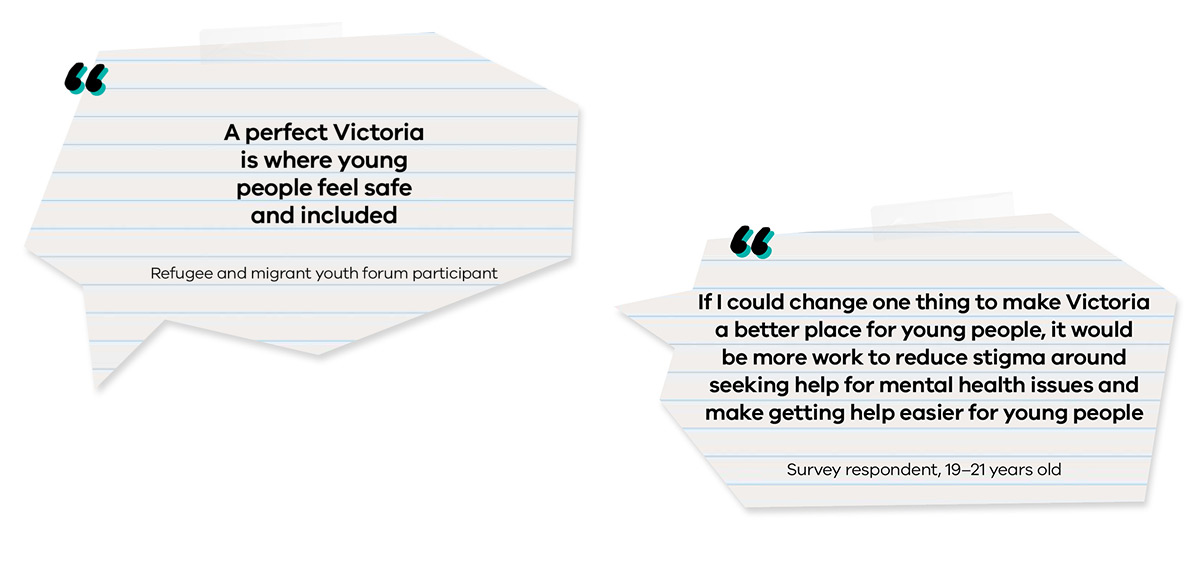
Young people want financial stability
Financial stability impacts and is influenced by all aspects of young people’s lives. This includes their socioeconomic status, family, housing, mental health, wellbeing and social networks. Young people know education and employment are key to independence and financial stability. They want education that responds to their individual needs as learners, and provides the life skills needed to transition to independence.
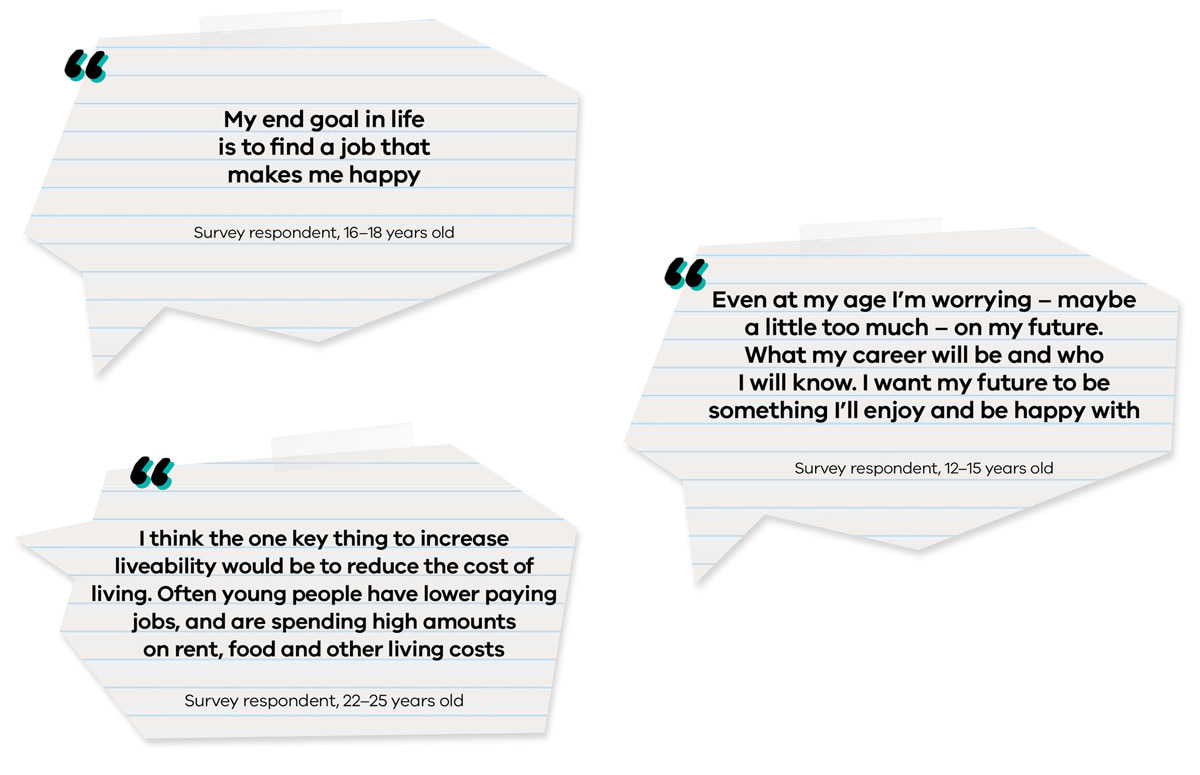
Young people want everyone to feel safe, valued and supported
Young people who are homeless, have experienced family violence or been involved in the youth justice system told us they need to be able to access information and supports that recognise that their lives and experiences are complex, including the impacts of their trauma. We heard that support should help them to get back on their feet and achieve their potential without limiting their freedom or individual choice.
Many young people face discrimination and barriers to success in education, training, workplaces and services. Ensuring all young people are included should be a key thing that government considers when we are developing policies and programs.
Young people in rural and regional areas told us they don’t want to need to leave their hometowns for opportunities. They want education and employment opportunities close to where they live, and transport available to get them where they need to go.
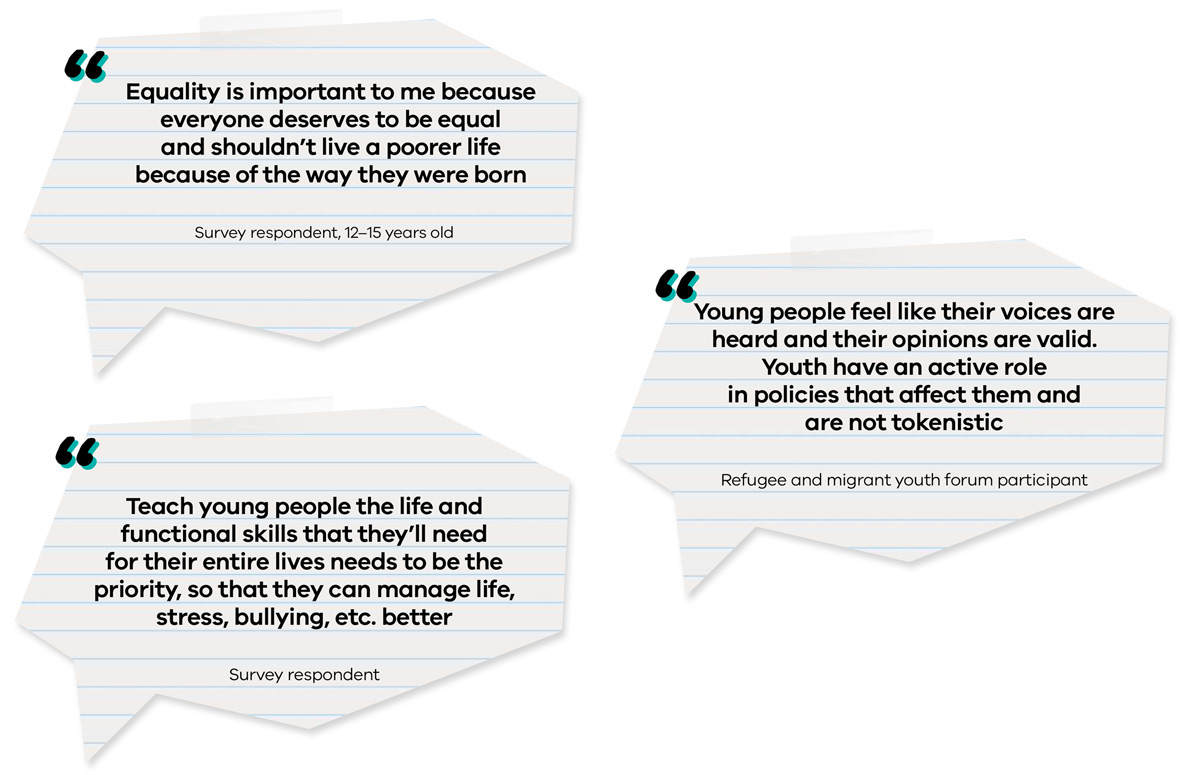
Young people want more support for their struggling families
Family has a strong influence on shaping young people’s values, behaviour and opportunities. Some young people said the lack of a strong family connection is one important issue they face. This included the impact of negative behaviours by family members, and the trauma that develops when their family can’t get the support it needs to overcome problems.
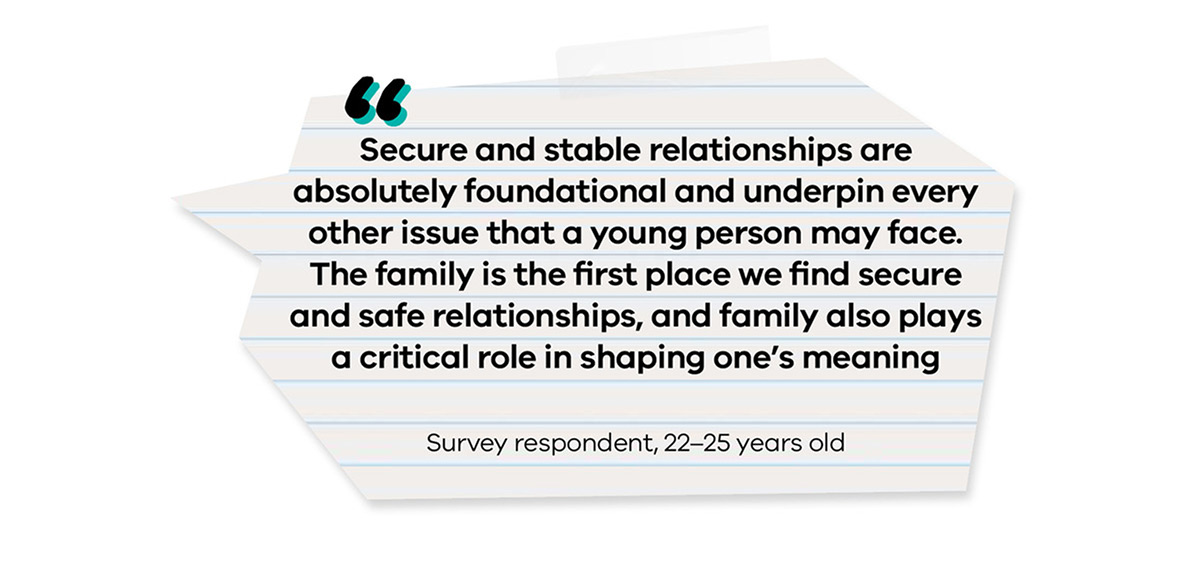
Young people want well-designed, developmentally informed services
Service delivery should focus on preventing problems and intervening early to reduce the chances of barriers and trauma affecting young people’s development over a long period. This includes considering expanding the Victorian Government’s definition of ‘young people’ from 12-25 to 10-25.
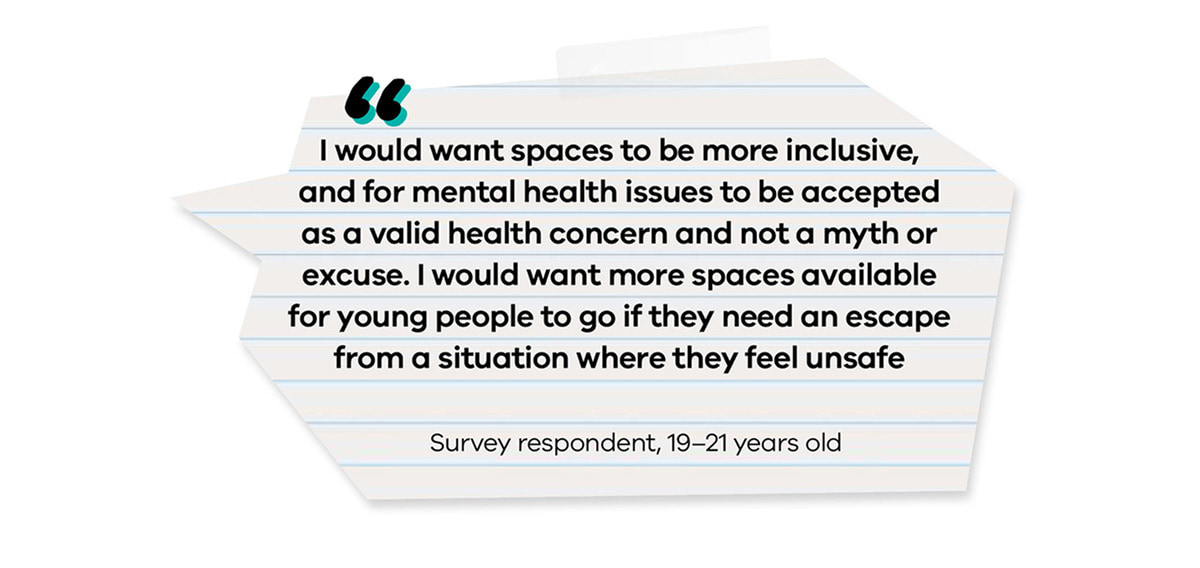
There are important differences for some young people
Although many young people share similar experiences, we know that some young people face additional and unique barriers and challenges.
Aboriginal young people
Self-determination needs to be at the foundation of everything we do with Aboriginal young people. They want policies and programs that help build their connection to Country, support them to be proud and strong, and are informed by their specific needs. Aboriginal young people also want Aboriginal services, such as Aboriginal community-controlled organisations that recognise the unique challenges they face and celebrate their identities.
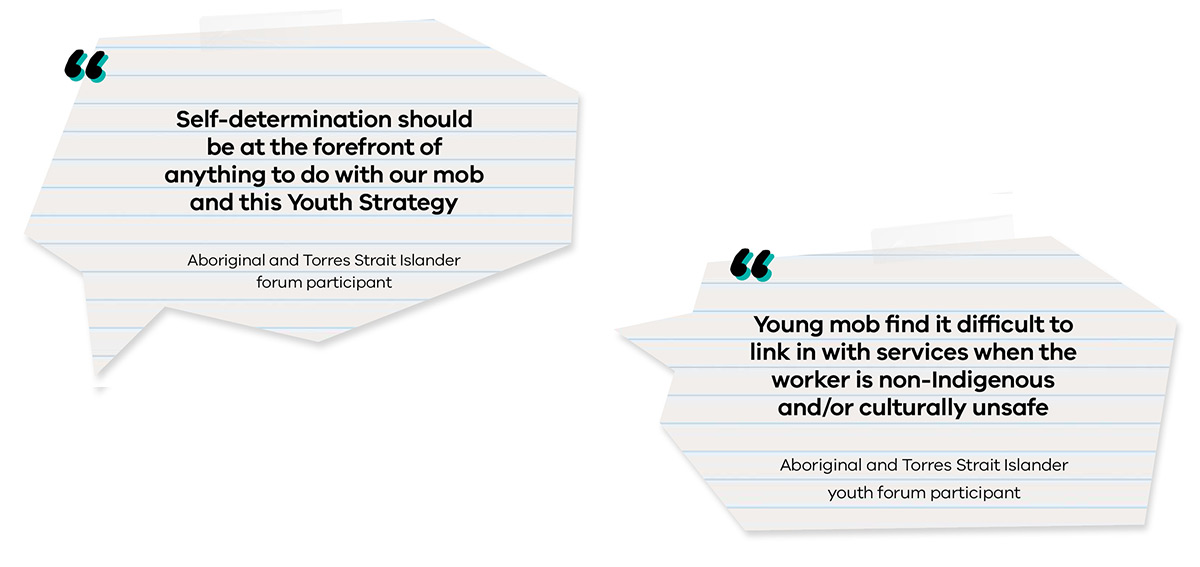
LGBTIQ+ young people
LGBTIQ+ young people often need to take on the role of educator, teaching their communities how to be aware and inclusive of all identities. They need to feel safe and supported, especially in environments like school, TAFE and university. LGBTIQ+ young people also need healthcare services that meet their needs, including health professionals who understand how to support them.
![‘[I want Victoria to be] a place where you don’t need to come out – just automatically accepted and validated. We don’t need to hide our love. We can be entirely open and unashamed.’ – LGBTIQ+ youth forum participant](/sites/default/files/Youth-Strategy-web-graphics_15b.jpg)
Disabled young people
Disabled young people told us that we must continue to challenge community attitudes towards disability. Access and inclusion are enablers in all aspects of their lives including work, housing, infrastructure and education. Disabled young people want transport they can use, support to develop life skills, and safe and accessible health care.
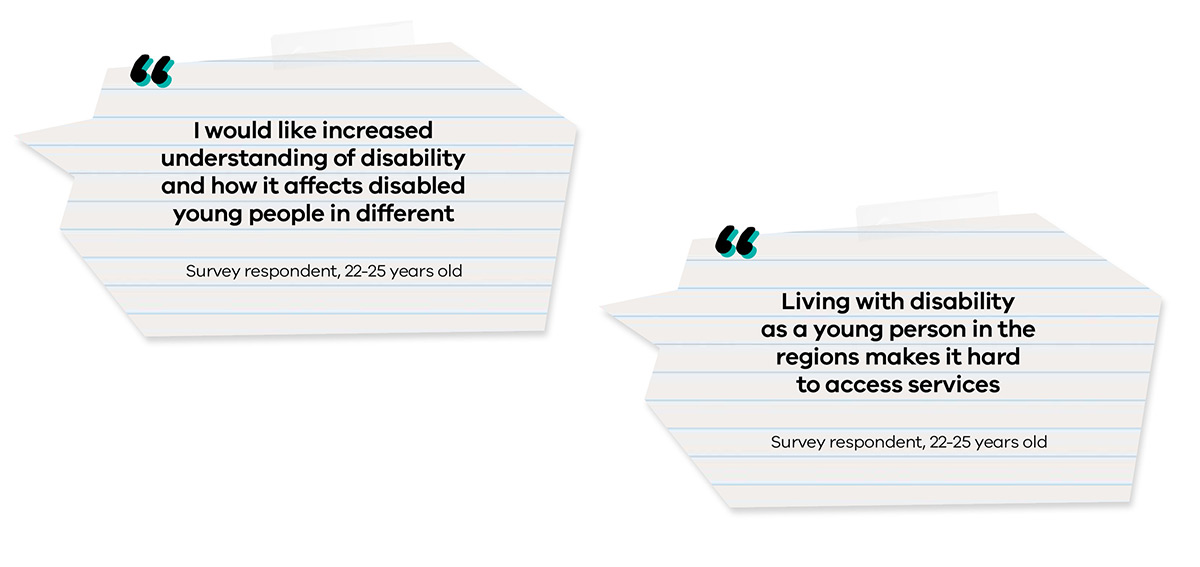
Multicultural and multifaith young people
Multicultural and multifaith young people want to feel proud of their culture and welcomed in all parts of Victorian society. They often feel burdened by the need to bridge the gap between their communities and mainstream services. Many experience overlapping forms of discrimination and marginalisation. It is important that we understand and respond to all aspects of their culture and identity.
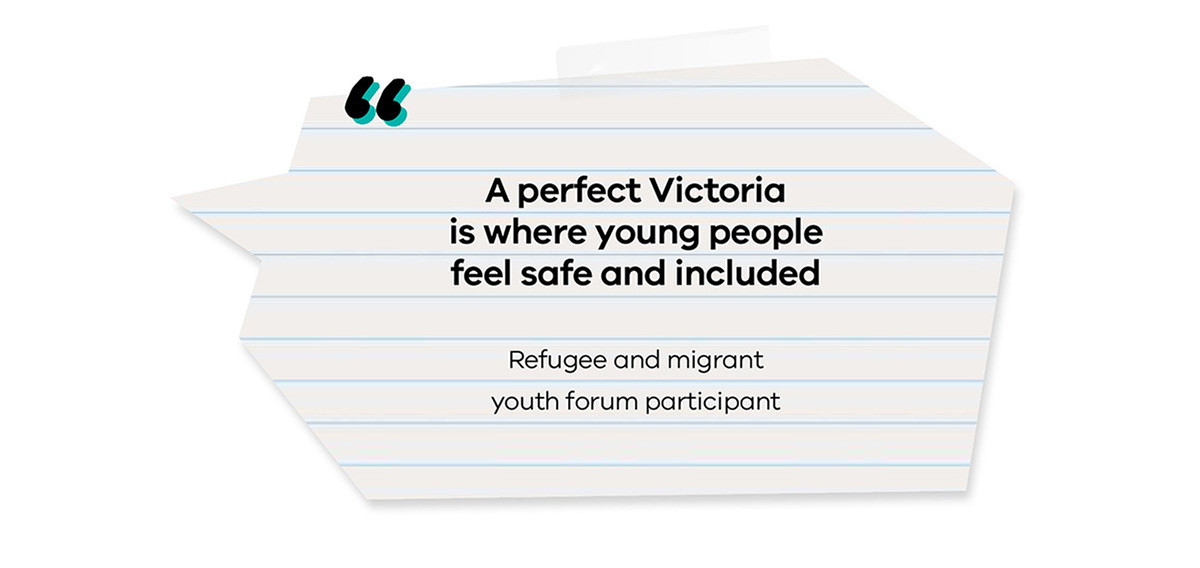
View the Youth Strategy
In this report…
Glossary
Aboriginal community-controlled organisations: Aboriginal community-controlled organisations are independent, not-for-profit organisations that are initiated, governed and operated by the local Aboriginal and/or Torres Strait Islander community.
Climate anxiety: A relatively recent psychological disorder afflicting an increasing number of individuals who worry about the environmental crisis. It is especially common among young people.
Discrimination: Discrimination is the unfair or prejudicial treatment of people and groups based on characteristics such as race, gender, age or sexual orientation.
Family violence: Family violence is any threatening, coercive, dominating or abusive behaviour that occurs between people in a family, domestic or intimate relationship, or former intimate relationship, that causes the person experiencing the behaviour to feel fear.
LGBTIQ+:
- Lesbian: used to describe a person who identifies as a girl or woman who is attracted to someone of the same identified gender.
- Gay: most commonly used to described someone who is attracted to someone of the same identified gender.
- Bisexual: an attraction to someone of the same gender and other genders. Everyone’s experience is a little different, and bi doesn't necessarily mean being attracted to only two genders.
- Transgender: sometimes gender diverse people feel that their gender doesn’t match the sex they were assigned at birth (for example, someone born with a penis might identify as a girl)–this is referred to as being transgender. Sometimes trans people change their name, their clothes, or even their bodies. Sometimes they don’t.
- Intersex: people are born with different kinds of bodies. People who are intersex are born with natural variations in their body that differ from what we might expect to be ‘typically’ male/female. This can include (but is not limited to) variations in hormones, chromosomes and sexual organs.
- Queer: a common umbrella term used to mean anyone who is same-gender attracted or gender diverse.
- Questioning: most people will question their sexual or gender identity at some point throughout their life. It can be a confusing time, but it is also normal.
- +: used to describe communities outside heteronormative and cisgender identities that fall under the queer umbrella.
Mainstream services: Mainstream services are the government systems providing services to the Victorian public – e.g., health, mental health, education, justice and housing.
Marginalised: Sometimes also called social exclusion–refers to people being pushed to the fringes of society due to a lack of access to rights, resources and opportunities.
Self-determination: Self-determination means different things to different people. The United Nations Declaration on the Rights of Indigenous Peoples (UNDRIP) describes self-determination as the ability for Aboriginal people to freely determine their political status and pursue their economic, social and cultural development. It also describes self-determination as a right that relates to groups of people, not only individuals.
Socioeconomic disadvantage: A lack of access to material and social resources, potentially reducing the ability to participate in society.
Tokenistic: When groups are involved in decision-making processes in ways that keep then powerless, under-informed and unaccountable.
Trauma: Trauma is an emotional response to a terrible event. Immediately after the event, shock and denial are typical. Longer term reactions include unpredictable emotions, flashbacks, strained relationships, and even physical symptoms like headaches or nausea.
Youth justice system: Youth justice supervises children and young people who are in the criminal justice system.

